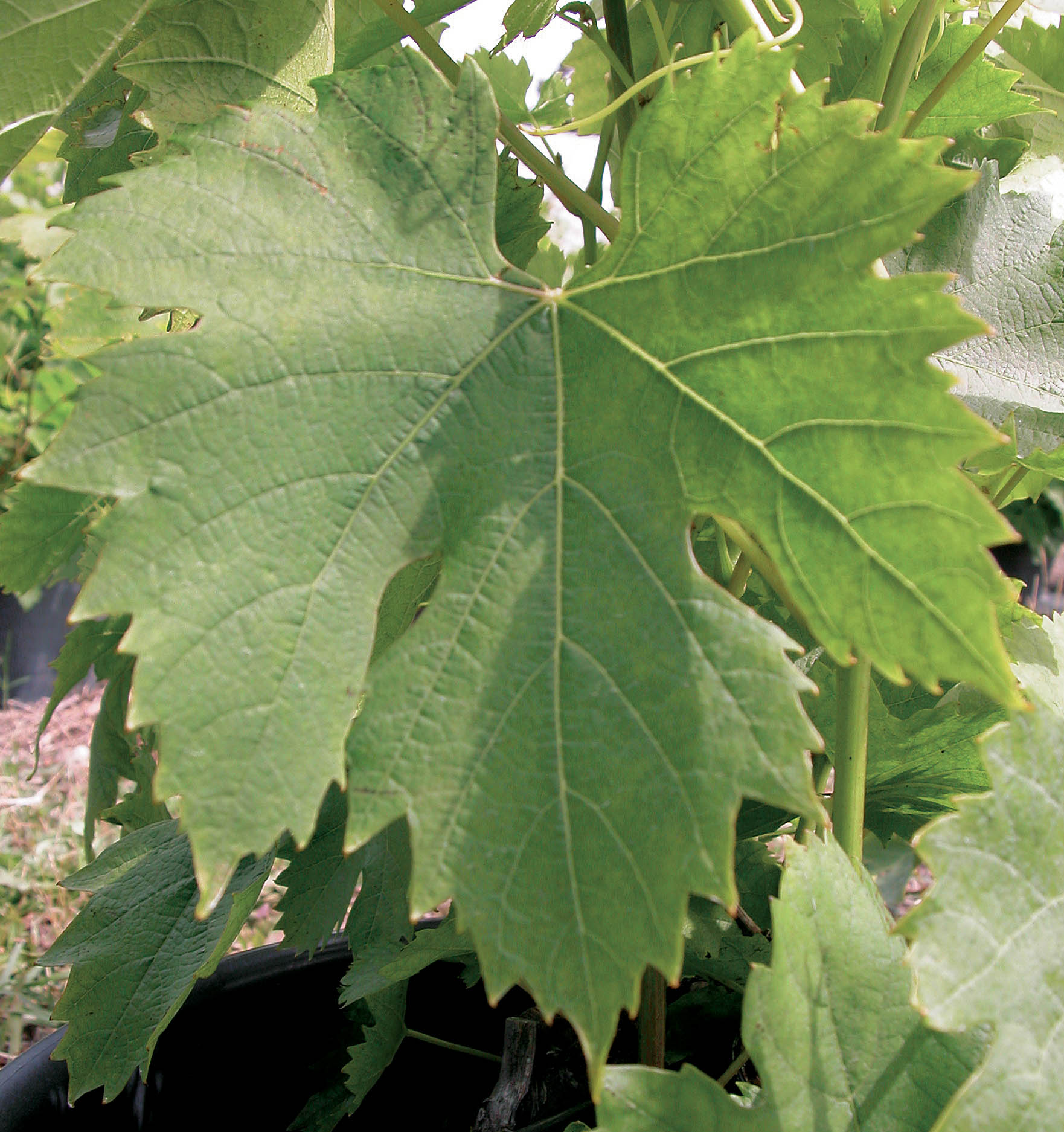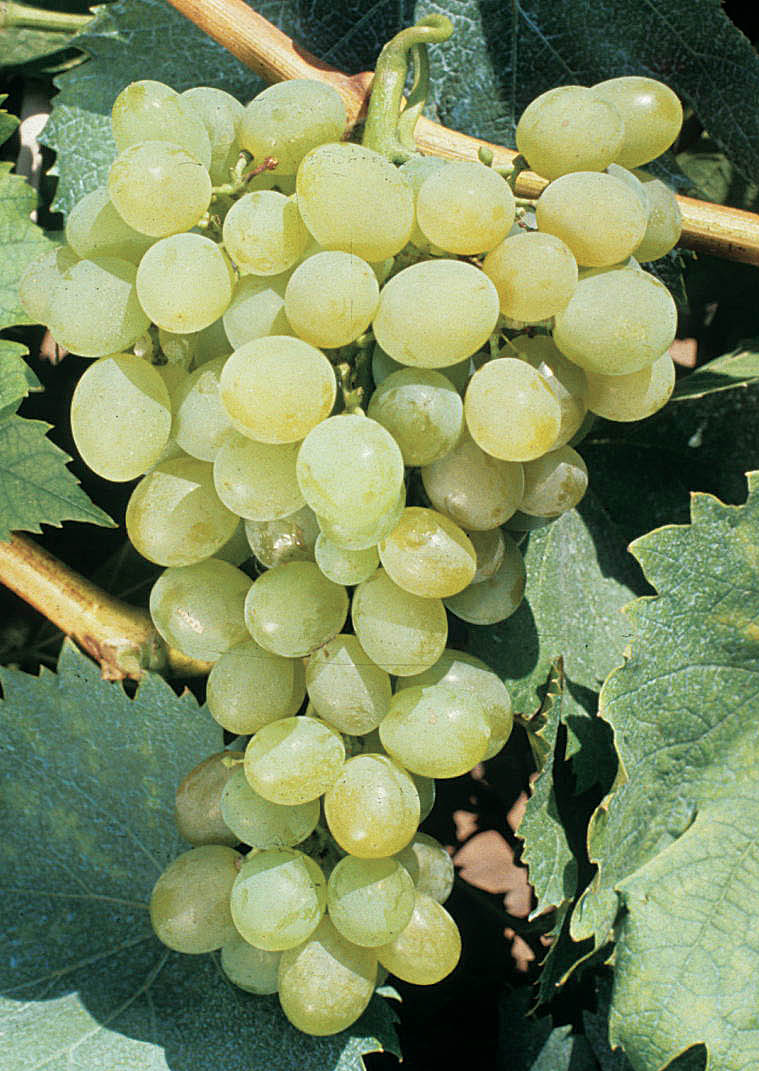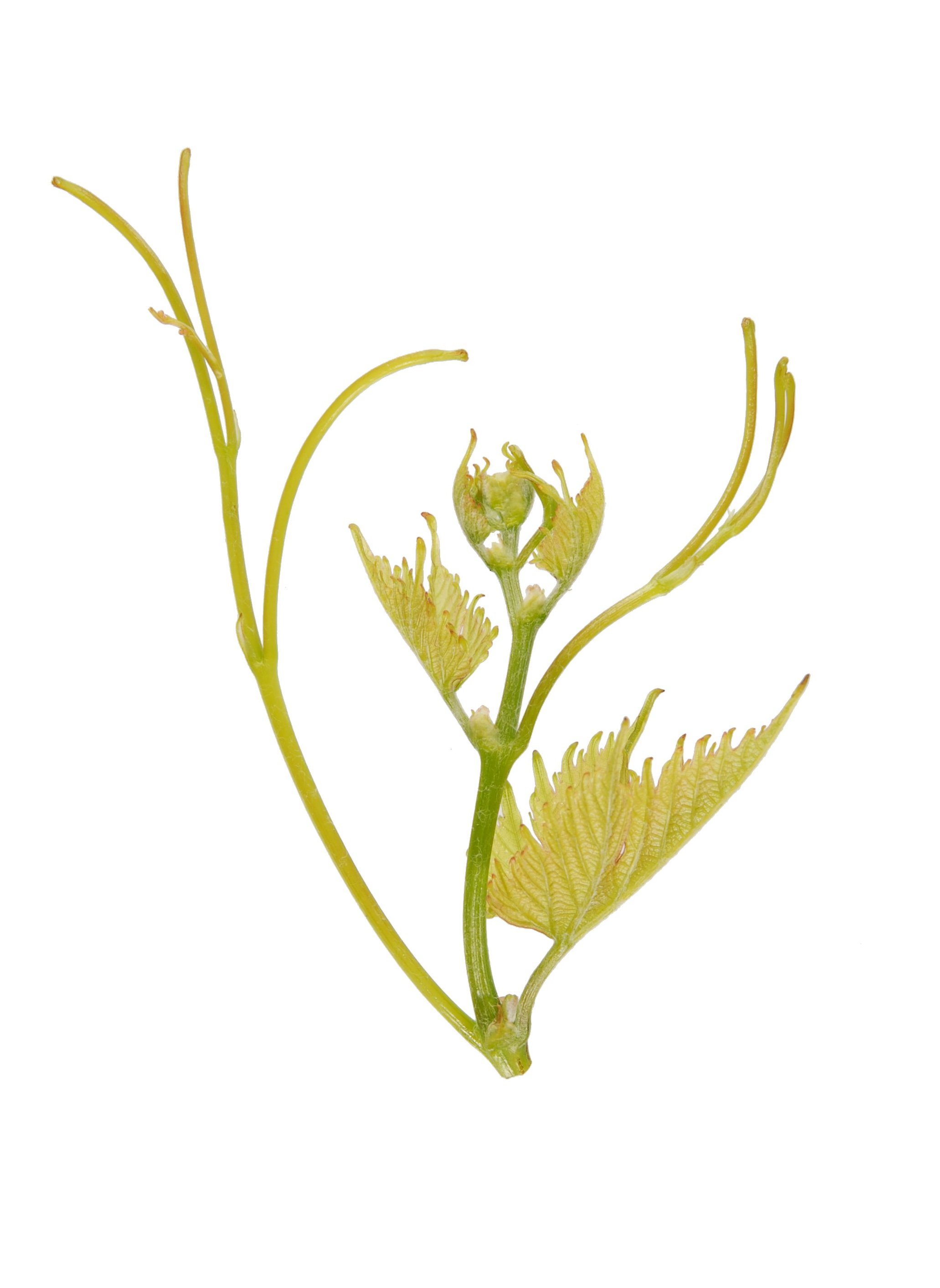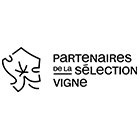Amandin
B
Variety exclusively for amateurs and private domestic use.
The geographical origin of the variety is specified or, if this is not possible, the area in which it is traditionally cultivated. The genetic origin of the variety is also indicated whenever it is known from hybridiser data or from genetic analyses published or obtained by the teams at INRAE in Montpellier (UMR AGAP) and Vassal-Montpellier Grapevine Biological Resources Centre (CRB-Vigne).
This variety was obtained in 1979 by INRA. This interspecific hybrid results from the crossbreeding of 7489 INRA and Muscat de Hambourg.
This information indicates the normal and statutory use for the grapes.
Variety exclusively for amateurs and private domestic use.
Name under which the variety is officially registered in the catalogue of grapevine varieties in France and under which it may be propagated and disseminated.
Amandin
Recognised alternative names that may be used to identify the propagation material of the variety in France or in other member countries of the European Union.
There is no officially recognized synonym in France nor in the other countries of the European Union, for this variety.
This information indicates on which list the variety is registered (A or B), whether it is classified for wine grapes, and in which member countries of the European Union the variety is also officially registered (for more information, see the "Legislation" menu.
In France, Amandin is officially listed in the "Catalogue of vine varieties" on the A list.
Evolution of cultivated areas in France
The figures provided are taken from vineyard land registers (IVCC, ONIVIT, ONIVINS), general agricultural censuses (SCEES-INSEE) and the current computerised vineyard register (DGDDI, FAM).
Regional vine planting data is available on the following site: https://visionet.franceagrimer.fr/Pages/DonneesInteractivesDocs.aspx?sousmenu=observatoire%20de%20la%20viticulture.
The figures provided are taken from vineyard land registers (IVCC, ONIVIT, ONIVINS), general agricultural censuses (SCEES-INSEE) and the current computerised vineyard register (DGDDI, FAM). Regional vine planting data is available on the following site: https://visionet.franceagrimer.fr/Pages/DonneesInteractivesDocs.aspx?sousmenu=observatoire%20de%20la%20viticulture.
Year |
ha |
|
|---|---|---|
|
2018 |
0 |


Only the principal ampelographic elements enabling the varieties to be characterised and identified are provided. They are presented according to the descriptor code recognised by the International Organisation of Vine and Wine (OIV), the International Union for the Protection of New Varieties of Plants (UPOV), the Community Plant Variety Office (OCVV) and Bioversity International (for more information, see the "Ampelographic glossary" menu). The photographs of leaves and grapes were taken in natural conditions, on the vine, in very similar situations in terms of growing conditions (sandy soil, Mediterranean coast): - Domaine de l'Espiguette (IFV), Le Grau du Roi (Gard), - Domaine de Vassal (INRAE), Marseillan (Hérault), - La Gaillarde Campus (Institut Agro | Montpellier SupAgro), Montpellier (Hérault). Only a few photographs, including the tips of bunches, were taken in other conditions.
- the tip of the young shoot with a low to medium density of prostrate hairs,
- the shiny and green young leaves with bronze or reddish spots,
- the wedge-shaped adult leaves, entire or with three or five lobes, with an open petiole sinus, medium to long teeth compared to their width at the base, straight sides, no or weak anthocyanin colorarion of veins, a smooth, involute leaf blade and on the lower side of the leaves, no or very low density of prostrate hairs and a low density of erect hairs,
- ellipsoid or ovoid berries with a slight muscat flavor.
Genetic profile
The genetic profile of the variety is provided for the 9 microsatellite markers (or SSR markers) selected under the European programme GrapeGen06 (http://www.eu-vitis.de/index.php) and by the OIV. The absolute size values of the alleles may vary slightly from one laboratory to another, but the relative differences between the two alleles of one single microsatellite are constant. The genetic analyses were conducted by the INRAE Montpellier team (UMR AGAP) and the IFV’s Plant Material Centre.
| Microsatellite | VVS2 | VVMD5 | VVMD7 | VVMD27 | VRZAG62 | VRZAG79 | VVMD25 | VVMD28 | VVMD32 |
|---|---|---|---|---|---|---|---|---|---|
|
Allele 1 |
133 |
229 |
247 |
176 |
186 |
256 |
240 |
235 |
255 |
|
Allele 2 |
143 |
236 |
249 |
186 |
192 |
262 |
254 |
243 |
271 |
The data on suitability are the result of field observations or, if none are available, of bibliography mining and the study of bibliographic references.
Amandin has moderate to strong vigor. This variety if fairly fertile and has a semi-erect or horizontal bearing. Amandin can be managed with moderately long pruning and must be trained.
These remarks are also the result of field observations or, if none are available, of bibliography mining and study of bibliographic references.
Amandin is not very sensitive to downy mildew, powdery mildew, anthracnose, black rot and grey rot, but it must be grafted.
The growth stages indicated are the result of obsrvations made at the Domaine de Vassal Estate where the set of these varieties form a collection. The results are indicated compared to the Chasselas vine variety as a reference in order to make comparisons between years and different sites. As such, for information purposes, the dates for the Chasselas B growth stage at Domaine de Vassal are as follows: - Bud burst, 21 March (average over 50 years) - Grape maturity, 14 August (average over 50 years)
Bud burst: 6 days after Chasselas.
Grape maturity: early-season, 1 week after Chasselas.
The size of grape clusters and berries indicated are based on the following scales: - Wine grape varieties Size : Very small Bunch (g) : ≤ 100 Berry (g) : 1 - Table grape varieties Bunch (g) : 150 Berry (g) : 2 - Wine grape varieties Size : Small Bunch (g) : 100 - 200 Berry (g) : 1,5 - 2 - Table grape varieties Bunch (g) : 150 - 250 Berry (g) : 2 - 3,5 - Wine grape varieties Size : Moderate Bunch (g) : 200 - 250 Berry (g) : 2 - 2,5 - Table grape varieties Bunch (g) : 250 - 400 Berry (g) : 3,5 - 5,5 - Wine grape varieties Size : Large Bunch (g) : 250 - 400 Berry (g) : 2,5 - 3,5 - Table grape varieties Bunch (g) : 400 - 700 Berry (g) : 5,5 - 8 - Wine grape varieties Size : Very large Bunch (g) : 400 Berry (g) : 3,5 - Table grape varieties Bunch (g) : 700 Berry (g) : 8 Remarks concerning the characteristics of the wines are generally based on tastings organised by juries of professionals.
Amandin's bunches are medium to large in size, not very compact and the berries are medium in size, juicy with a thick skin.
In this section, the list of certified clones is given. Information on clone conservatories is also provided.
The only certified Amandin clone carries the number 5002.
Bibliography
- Catalogue des variétés et clones de vigne cultivés en France. Collectif, 2007, Ed. IFV, Le Grau-du-Roi, France.
- Documentary collections of the Centre de Ressources Biologiques de la Vigne de Vassal-Montpellier, INRAE - Institut Agro | Montpellier, Marseillan, France.
Description of clones approved in France
In this section, the list of certified clones is given. Information on clone conservatories is also provided.
In this section, the list of certified clones is given. Information on clone conservatories is also provided.
-
Clone number
-
Brand
-
Origin
Region, department or winegrowing region in which the “clone mother plant” was identified and selected.
-
Selection
Body or bodies which selected the clone. In France, clonal selection is the responsibility of the selection organisations (themselves accredited by the ministry in charge of agriculture), usually in close collaboration with a technical partner working in a winegrowing region. For clones certified after 1999, the name of the partner or partners who took part in the selection work is also included. (NB: CA = Chamber of Agriculture).
-
Year of approval
Year in which the clone was certified by the FranceAgriMer board further to a proposal by the Vine section of the CTPS (Permanent Technical Committee for Plant Selection).
-
Agronomic Reference
Region, department or winegrowing region in which the agronomic and technological data were collected.
-
Surface in multiplication
Surface area in hectares (ha) of stock nurseries used for propagation for the year under consideration (in brackets), which allows the available potential to be evaluated. Clones with a surface area of between 0.01 and 0.10 ha are shown as <0.10 ha. Clones of limited dissemination, but for which we have technical data, are shown as <0.01 ha. Other clones are given as “low-dissemination clone”, which means that the clone has been certified only recently or has not been propagated. In both cases, only the initial material is planted in the selection centres.
-
 B
B -
5002
-
INRA
-
1987





